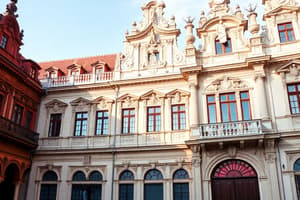Podcast
Questions and Answers
Which of the following is NOT considered a category of statecraft?
Which of the following is NOT considered a category of statecraft?
What is a key difference between 'hard power' and 'soft power' in diplomacy?
What is a key difference between 'hard power' and 'soft power' in diplomacy?
Which of the following is NOT considered a tool of public diplomacy?
Which of the following is NOT considered a tool of public diplomacy?
What is the main purpose of economic sanctions as a tool of statecraft?
What is the main purpose of economic sanctions as a tool of statecraft?
Signup and view all the answers
Deterrence, compellance, and defense are all examples of:
Deterrence, compellance, and defense are all examples of:
Signup and view all the answers
How can 'information warfare' be considered a threat to national security?
How can 'information warfare' be considered a threat to national security?
Signup and view all the answers
What is the significance of 'just war principles' in relation to military power?
What is the significance of 'just war principles' in relation to military power?
Signup and view all the answers
What is one reason why soft power is becoming increasingly important in statecraft?
What is one reason why soft power is becoming increasingly important in statecraft?
Signup and view all the answers
Study Notes
Statecraft Definition and Purpose
- Statecraft is the art of managing state affairs and promoting national interests internationally.
- Its goal is to achieve foreign policy objectives and strengthen a nation's global position.
- Main categories: diplomacy, economic tools, military power, and information/cyber warfare.
Diplomacy: Tools and Actors
- Diplomacy is the formal and informal communication/negotiation between states.
- Key actors include diplomats, embassies, and international organizations.
- Tools include:
- Hard power: treaties, alliances, international agreements.
- Soft power: attraction, persuasion, cultural exchange, and public diplomacy.
Soft Power Definition and Sources
- Soft power involves influencing others through attraction and persuasion, not coercion.
- Sources of soft power include: culture, values, policies, scientific advancements, and global engagement.
Public Diplomacy Definition and Methods
- Public diplomacy is the government's effort to communicate directly with foreign publics, building understanding and support for national ideals.
- Methods include cultural and educational exchanges, media engagement, broadcasting, and social media.
Economic Tools and Examples
- Economic tools include incentives (like foreign aid, trade agreements, investments) and sanctions (embargoes, tariffs, asset freezes).
- Examples include:
- The Marshall Plan
- NAFTA and USMCA
- Sanctions against Iran and North Korea
- Potential tariffs against Canada and Mexico.
Military Power and Ethical Considerations
- Military power involves using armed forces to achieve foreign policy goals.
- Military tools include deterrence, compellance, and defense.
- Ethical considerations: adhering to just war principles and minimizing civilian casualties are important.
Information and Cyber Warfare
- Information and cyber warfare use technology to influence public opinion and weaken adversaries.
- Methods include propaganda, disinformation campaigns, psychological operations, and cyberattacks.
- Examples include Russian interference in elections and Stuxnet.
Key Takeaways on Statecraft
- Successful statecraft requires combining various tools – diplomacy, economics, military, and information.
- Soft power's role is becoming increasingly vital.
- Ethical considerations are crucial when using military and other tools.
Studying That Suits You
Use AI to generate personalized quizzes and flashcards to suit your learning preferences.
Description
This quiz explores the concepts of statecraft and diplomacy, including fundamental definitions and purposes. You'll learn about the tools and actors involved in diplomatic efforts and the significance of soft power in international relations.




